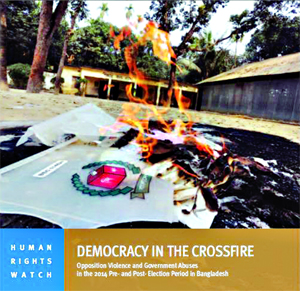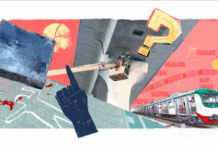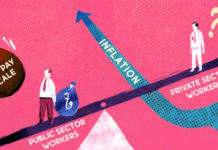The US-based Human Rights Watch came up with its observation that Bangladesh democracy is in cross-fire due to the violence which scarred the January 5 national elections.
“These were the bloodiest elections since independence, and unless concrete steps are taken to address what happened, the situation in Bangladesh is likely to worsen,” Brad Adams, Asia director of HRW, said in a new report published on Wednesday.
The 64-page report, “Democracy in the Crossfire: Opposition Violence and Government Abuses in the 2014 Pre-and Post-Election Period in Bangladesh,” details violent protests by opposition activists who called for an election boycott.
“It is important that the leaders of the main political parties not only make public statements denouncing this senseless violence, but also take measures to censure party members found responsible for the violence.”, said Brad Adams
The report pointed out that on numerous occasions, opposition party members and activists threw petrol bombs at trucks, buses, and motorized rickshaws.
In some cases, opposition group members forced children to carry out the attacks and in response, the government unleashed a brutal crackdown, the report said. Human Rights Watch researchers documented how members of law enforcement agencies carried out extrajudicial executions, enforced disappearances, arbitrary arrests, and the unlawful destruction of private property.
The Bangladesh authorities should prosecute members of law enforcement agencies found responsible for unlawful killings, torture, and other human rights abuses, the report said.
Leaders of the main political parties should make clear and unambiguous public statements opposing violence by their supporters, it added.
For the report, Human Rights Watch interviewed more than 120 people, including victims, their family members, and eyewitnesses. Abuses documented were committed by members of opposition groups and law enforcement agencies before, during, and after the elections.
“CROSSFIRE” KILLINGS
Human Rights Watch also repeated its call to the government to end the reign of impunity enjoyed by Bangladesh’s security forces.
After the elections, the security forces unlawfully arrested opposition leaders, naming them as suspects in violent attacks, according to the report.
Researchers documented the killing or unlawful arrests of 19 opposition leaders and activists. In nine of the killings, authorities claimed that the victims were killed in “crossfire” during gunfights between the security forces and armed criminals.
In all nine cases, there is strong reason to question the official account, HRW said.
In several of the alleged crossfire cases, witnesses said the killed person had been detained hours or days earlier, contradicting government claims, the report mentioned.
Security forces have little credibility when they simply claim that suspects die in crossfire, as they have regularly invoked the “killed in crossfire” explanation to justify what the evidence later showed to be cold-blooded executions of detainees or suspects.
Criticizing law enforcement agencies in Bangladesh for its dismal human rights record, the reports said, “In particular, the Rapid Action Battalion (Rab) has committed systematic human rights violations with impunity since its founding in 2004, which contributes directly to the culture of ongoing abuses.”
Rab should be disbanded and replaced with a fully accountable civilian law enforcement agency dedicated to fighting crime and terrorism, Human Rights Watch said.
“The Bangladeshi government needs to stop protecting its security forces, and make good on public pronouncements of zero tolerance for impunity,” Adams said.
“The violence leading up to the January elections was entirely predictable, and yet the government did nothing to stem the abuses and have done nothing since to deliver justice to the victims,” he said.
The HRW called upon the government should investigate all attacks on religious minorities and prosecute the perpetrators.
Given Bangladesh’s long failure to deliver on justice, Human Rights Watch urged the government to establish an independent, external body to conduct prompt, impartial, and independent investigations into all allegations of violations by law enforcement agencies including the police, Rab, and Bangladesh Border Guards.
Such a mechanism should be invested with the mandate to investigate and to recommend prosecution of commanding officers and others in a position of authority who knew of abuses and failed to take action to prevent or punish abuses.
The human rights watchdog has recommended actions against those involved in ‘unlawful killings and torture.’
Source: Weekly Holiday










